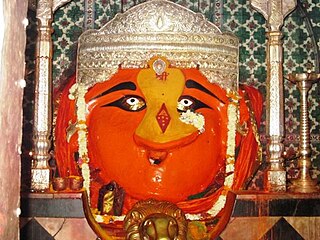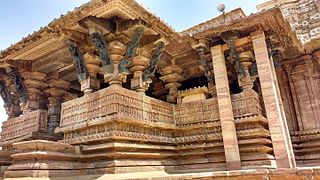
Kartavirya Arjuna was a king of an ancient Haihayas kingdom with capital at Mahishmati which is on the banks of Narmada River in the current state of Madhya Pradesh. Kartavirya was son of Kritavirya, king of the Haihayas. According to the Puranas, Haihaya was the grandson of Sahasrajit, son of Yadu. This is his patronymic, by which he is best known; he is also referred to simply as Arjuna. He is described as having a thousand hands and a great devotee of god Dattatreya.

Atri or Attri is a Vedic sage, who is credited with composing numerous hymns to Agni, Indra, and other Vedic deities of Hinduism. Atri is one of the Saptarishi in the Hindu tradition, and the one most mentioned in its scripture Rigveda.

Dattatreya, Dattā or Dattaguru, is a paradigmatic Sannyasi (monk) and one of the lords of yoga, venerated as a Hindu god. He is considered to be an avatar and combined form of the three Hindu gods Brahma, Vishnu, and Shiva, who are also collectively known as the Trimurti, and as the manifestation of Parabrahma, the supreme being, in texts such as the Bhagavata Purana, the Markandeya Purana, and the Brahmanda Purana, though stories about his birth and origin vary from text to text. Several Upanishads are dedicated to him, as are texts of the Vedanta-Yoga tradition in Hinduism. One of the most important texts of Hinduism, namely Avadhuta Gita is attributed to Dattatreya. Over time, Dattatreya has inspired many monastic movements in Shaivism, Vaishnavism, and Shaktism, particularly in the Deccan region of India, Maharashtra, Gujarat, Madhya Pradesh, Rajasthan and Himalayan regions where Shaivism is prevalent. His pursuit of simple life, kindness to all, sharing of his knowledge and the meaning of life during his travels is reverentially mentioned in the poems by Tukaram, a saint-poet of the Bhakti movement.

Baba Budangiri, also known as Chandradrona, is a hill and mountain range in the Western Ghats of India, located in the Chikkamagaluru district of Karnataka.

Renuka, also known as Yellamma, is a Hindu mother Goddess worshipped predominantly in the South Indian states of Karnataka, Tamil Nadu, Telangana, Kerala, Andhra Pradesh and the western state of Maharashtra. She is the mother of Parashurama, the sixth avatar of god Vishnu. She was given the name "Renuka" and acquired the status of a mother goddess before eventually being associated with the legend of Parashurama.
In the Mahabharata epic, the Heheya Kingdom is one of the kingdoms ruled by Chandravanshi (Yadava) kings in central and western India. It was ruled by Kartavirya Arjuna, who defeated Ravana. Its capital was Mahishmati on the banks of river Narmada in present-day Madhya Pradesh. Talajangha was an allied kingdom to the east of Heheya. They conquered many other kingdoms of India until enmity with the warrior Bhargavas resulted in their demise. Parasurama was the Bhargava leader who ended the kingdom.

Anasuya is an ascetic, and the wife of Sage Atri in Hinduism. She is the daughter of Devahuti and the Prajapati Kardama in Hindu texts. In the Ramayana, she lives with her husband in a small hermitage on the southern border of the Chitrakuta forest. A pious woman who leads an austere life, she is described as having miraculous powers.

Shri Swami Samarth Maharaj also known as Swami of Akkalkot was an Indian Hindu god of the Dattatreya Tradition. He lived during the nineteenth century from 1858 to 1878 and is a known spiritual figure in various Indian states including Karnataka and Maharashtra. Swami Samarth traveled all across the Indian subcontinent and eventually set his abode at Akkalkot, a village in present-day Maharashtra. He is thought to have arrived at Akkalkot on a Wednesday, during either September or October in 1856. He resided at Akkalkot for close to 22 years.
Vishnu Puran is an Indian television series, by B. R. Chopra on the Hindu deity Vishnu. It is based on the Bhagavata Purana. Bhagavata Purana tells about the 10 incarnations of Vishnu, as well as other stories, such as the legend of Dhruva. The weekly series first aired Sunday morning, 23 January 2000 on Zee TV. The 124 episodes were later released on DD National.

An onavillu is a simple, short, bow-shaped musical instrument. Its name may come from Onam, a festival in Kerala where the instrument is used in dances, and villu, which means 'bow' in Malayalam. Although still regularly used in rural art forms, use of the onavillu is on the decline.

Sri Venkateswara Mahatmyam is 1960 Indian Telugu-language Hindu mythological film directed by P. Pullaiah and produced by V. Venkateswarlu. It is based on the Venkateswara avatar of Vishnu at Tirumala. It stars N. T. Rama Rao, Savitri, and S. Varalakshmi with music composed by Pendyala Nageswara Rao. The film was dubbed into Tamil and released as Srinivasa Kalyanam.

Datta Jayanti, also known as Dattatreya Jayanti, is a Hindu festival, commemorating the birth of the Hindu deity Dattatreya (Datta), a combined form of the Hindu male divine trinity of Brahma, Vishnu, and Shiva.

The earliest temples in Telangana include the Alampur Navabrahma Temples built during the 6th century CE by the Badami Chaulukyas.
The Tripura Rahasya meaning The Mystery beyond the Three Cities, is an ancient literary work in Sanskrit believed to have been narrated by Dattatreya to Parashurama. It is an ancient prime text which is one of the treatises on Advaita school of classical Indian metaphysics.

Sri Tirupati Venkateswara Kalyanam is a 1979 Indian Telugu-language Hindu mythological film, based on Lord Venkateswara Avatar at Tirumala, produced and directed by N. T. Rama Rao under his Ramakrishna Cine Studios banner. It stars N. T. Rama Rao, Jaya Prada, Jayasudha, Nandamuri Balakrishna and music composed by Pendyala Nageswara Rao.

Abaya Hastha Swayambu Sri Lakshmi Narasimha Swamy Temple is a holy Hindu religious site in the village of Agaram Agraharam in Hosur taluk of Krishnagiri district in the Indian state of Tamil Nadu. It is located 15 km from Hosur on Rayakotta Road and 65 km from Bangalore.

Sakunthala is a 1966 Telugu-language Hindu mythological film directed by Kamalakara Kameswara Rao. The film stars N. T. Rama Rao and B. Saroja Devi, with music composed by Ghantasala. It is produced by Lakshmi Rajyam and Sridhar Rao under the Rajyam Productions banner.

Sati Anasuya is a 1957 Telugu-language Hindu mythological film, based on the life of Anasuya, produced by Sundarlal Nehata under the Rajyasri Productions banner and directed by K. B. Nagabhushanam. It stars N. T. Rama Rao, Anjali Devi, and Jamuna, with music composed by Ghantasala.














